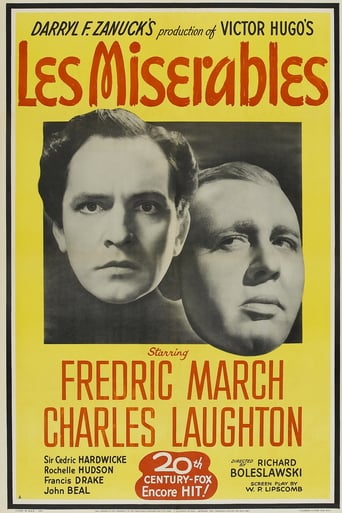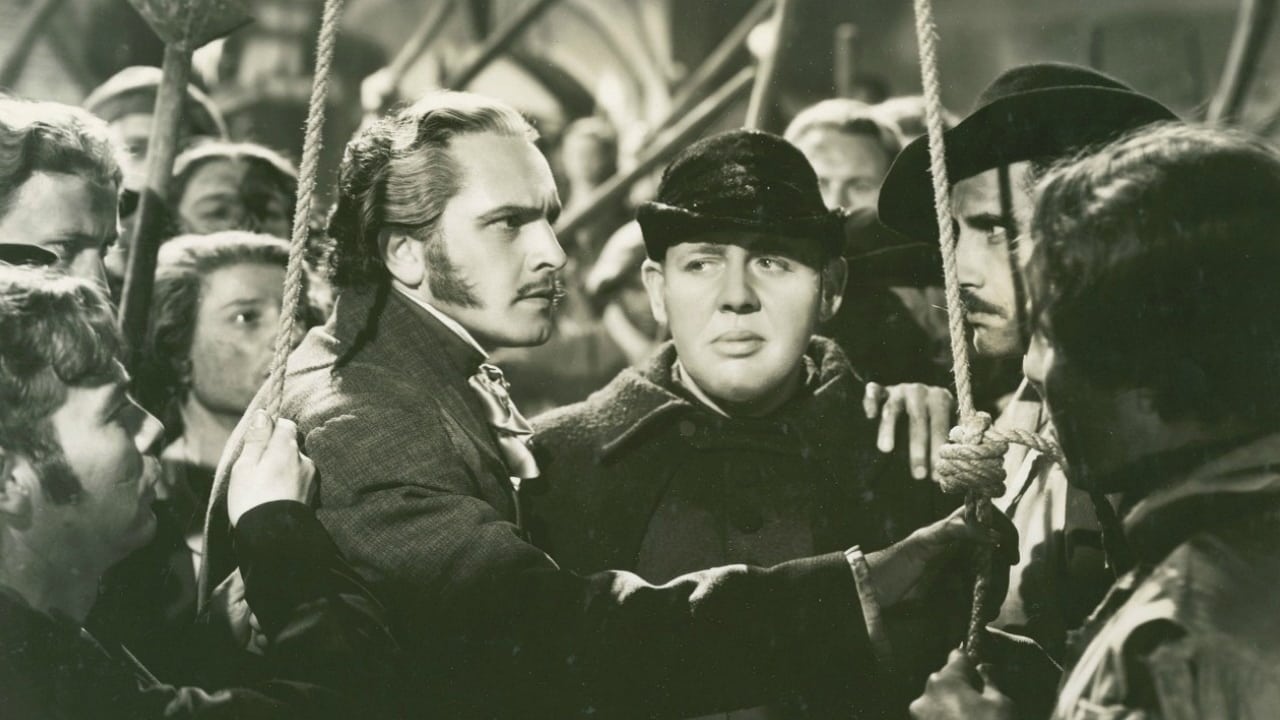tonstant viewer
Advantages here: Charles Laughton's Javert, Gregg Toland's cinematography, um, um.........This film was made by 20th Century as a remake of the French version of two years earlier. The French version totals five hours in all, which allows a more grownup script, a better sense of pace, a fuller exploration of the characters and a more authentic flavor all around.There is something vaguely infantile about this version and Fredric March has about as much European savor as corn-on-the-cob. Charles Laughton unbalances the film with his famous portrayal of the obsessed cop Javert, and the film becomes about his agony, not Jean Valjean's, which is wrong.The Raymond Bernard film from 1933 is available now in a two-DVD set, and is the closest you can get on film to the experience of actually reading the book, which is long and spacious and worth it. Certain individual scenes are done better in other versions, but the Bernard film is the best overall.
jamesmmahoney
This 1935 version of "Les Miserables" is perhaps the finest film ever produced during Hollywood's golden age. Highlighted by superb acting from three of the greatest English-speaking actors ever to appear on film (March, Laughton and Hardwicke), a superb script and outstanding production values, this 20h Century Fox production has more than stood the test of time. Now released on DVD, it is available for modern audiences to view and compare to other filmed and staged versions of this classic Victor Hugo tale. Even now, 73 years after it was filmed, it never fails to move the viewer with its extraordinarily powerful narrative. A not-to-be-missed film from Hollywood's Golden Age!
theowinthrop
To begin with, I doubt that most people realize that Victor Hugo's Les Miserables is not a two hundred to four hundred page novel. It is a thirteen hundred page novel (in English translation as well as the original French). This actually puts it into the same category as those other classic that most people never read: "The Bible" (both testaments together), "Don Quixote", "War and Peace", "Clarissa Harlowe", "The Decline and Fall of the Roman Empire", "The Count of Monte Cristo". Everyone knows stories or chunks of most of these books (except for Richardson's "Clarissa", which is not popular these days due to it's epistolary style). Few read them to get an idea of their full impact. It is sobering to realize that humongous novels by Dickens and Thackeray and George Eliott, like "Bleak House, "Pendennis", or "Middlemarch", are shorter (roughly 800 pages each) than these seven earlier titles that I mention. That means one is more likely to be willing to read "Middlemarch" (a thoughtful but difficult study of provincial life in 1832 England), than "The Count of Monte Cristo" (with it's fast paced and exciting tale of power, greed, and revenge in post-Napoleonic France.In it's full range, "Les Miserables" was a probing attack on the greed and social evil rampant in France from 1815 to 1832 (the beginning of the so-called "July " or Orleans Monarchy. However I warn you that if you read it you will find it annoying after awhile. You will remain sympathetic towards Valjean, protecting little Cosette who he raises as his daughter, and saving Marius (although he would as soon Cosette never saw Marius again). And you will also dislike Javert, his adversary - the perfect police official. But you will find Hugo expounding questionable views on criminals. Not all the poor are criminals, but after reading Hugo one gets the impression that if they aren't they are fools. For all the defects of Louis Phillippe's July Monarchy, it gave France prosperity and peace for nearly two decades. But to Hugo it was a criminal throwback to the barbarism of the Bourbons - France did not need monarchs, it was a republic and a democracy. For most of his life Hugo attacked "royalism" in all its guises in France, culminating in his years in exile in opposition to the Second Empire of Napoleon III (1851 - 1870 - the period that Hugo wrote "Les Misearbles" in). Oddly enough he never really attacks the first Napoleon. Read the chapters on the Battle of Waterloo in "Les Miserables" and it is almost a regrettable valentine to the little Corsican. Interestingly enough, when the Paris Commune burned much private property in 1871 (before being put down by French troops assisted by German troops), Hugo suddenly ceased being so admiring about the lowest level of the poor - after all they burned some of his property too. Trimmed of much of it's literary weight it makes a dandy little over-the-years thriller, and it has been filmed many times. The best one I remember was a French version from 1956 with Jean Gabin as Valjean (and actually he was physically closer to the poor ex convict than March was). But it was three and a half hours long, so I suspect that this one will have to do. It keeps the main threads of the story together, and performances by March, Laughton, Florence Eldritch (as Fantine), and others are excellent. Even Leonid Kinski as one of March's former convict friends gives a chilling little moment just by saying "Hello Jean" in a courtroom. So watch it, the best normal length movie version. And then put aside a month for reading the original novel (and then plan similar time schemes for those other unread classics I just listed - It will occupy you for about a year and a half or so).
Jesús Ibarra
In my opinion, this version is far from being the best adaptation of Victor Hugo's classic and marvelous novel; these are my reasons: The Thernardiers, indispensable characters in the story, are relegated in the film to mere incidental figures. Their little son Gavroche does not even appear. Their daughter Eponine appears, but she has nothing to do with them, she is only a friend of Marius, in love with him. Fauchelevent also appears as an incidental character, when Jean Valejan saves him from dying; he does not appear when Valjean and Cosette arrive to the Petit-Picpus convent. The film does not end as the original story. Much better versions are the French ones directed in 1934 by Raymond Bernard, starring Harry Baur as Jean Valjean, and the 1982 directed by Robert Hossein, starring Lino Ventura as Jean Valjean.


 AD
AD



